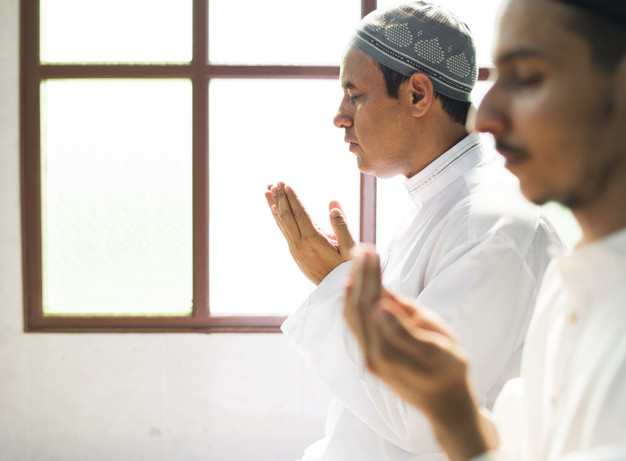Answer
Salam Dear Sabah,
Thank you for your question and for contacting Ask About Islam.
Many Muslims are aware they could pray in a better manner so you are not alone in your concerns. The point, as you say, is what can be done about it?
Prayer Is a Relationship
Prayer in Islam is a pillar of the religion, not a ‘ritual’ as many people seem to think. It is the establishment of a close and special relationship with our Creator, Allah.
Of course, the prerequisite for prayer is purity. This applies to clothes and to ablution, which are the requirements for physical cleanliness.
Then comes the intention, which is the requirement for spiritual cleanliness and purity.
When one stands up in prayer, one begins with ‘Allahu Akbar’ (God is Great), raising one’s hands (at least shoulder-high), facing the Ka’aba (the direction for Muslims to pray) and entering the state of prayer.
It is as if we are saying goodbye to the physical world and ‘entering’ the spiritual world, dwelling in the presence of Allah.
It is as if we are entering into the Court of the Greatest Authority, King of Kings and Lord of the universe.
Beginning the Prayer
We can start our prayers with Glorification of Allah by saying, in Arabic:
‘Glory to You, O Allah and with Your praise.’
‘Blessed is Your Name.’
‘High is Your station.’
‘And there is no God besides You.’
What a beautiful way of starting a dialogue with our Creator!
Then we recite the opening chapter of the Quran, Al-Fatihah, which starts:
In the name of God, Most Gracious, Most Merciful. Praise be to God, the Cherisher and Sustainer of the worlds… (Quran 1:1-2)
He is Lord of all the worlds: my world, your world, the world of every human or creature, the world of the winds, of the oceans, trees, stars and galaxies; all the worlds we know and those we don’t.
This is as well as the worlds in each of the seven heavens and the world of the angels, etc.
Thus, the enormity of His Kingdom and His Glory dawns upon us as we praise Him as the ‘Lord of the Worlds’. The magnificence of His creations and His worlds dawns upon us.
This creates humility and submission in facing Him — it is the basis of khushu’. How can we not be humble, in front of such a Creator and such an Owner of all things?
Most Gracious, Most Merciful…
Here, Allah says: ‘My servant has praised me.’ Then the Fatihah continues:
Most Gracious, Most Merciful… (Quran 1:3)
His Mercy and His Compassion are for all His creation, whether they believe in Him or not and whether they obey Him or not.
His beneficence is flowing for all His creations. Ar-Rahman and Ar-Rahim mean He is the Most Merciful.
According to a hadith qudsi, God’s mercy is divided into 100 parts. One part has been sprinkled throughout the universe and 99 parts have been retained, by Allah, for the believers on the Day of Judgment.
Here Allah answers: ‘My slave has recognized My mercy.’
These are just some bits and pieces from a longer dialogue Allah shares with us during the prayer.
Ways to Maintain Khushu and Khudhu

According to our Prophet Muhammad (peace be upon him), whose example we follow, you can maintain khushu’ (humility) and khudhu’ (concentration) by doing certain things:
We should learn the meaning of every word we say in the prayer (salat), understand it, and make sure we mean it when we say it.
Only then, we can maintain and establish the meaning of what we say, not only by our tongues, but deep in our hearts.
Each time you pray, think that this prayer may be your last prayer and give complete attention to it. It might be our last chance to worship Allah and show Him our sincere belief!
Always know you are in the presence of Allah and worship Him as if you see Him with your physical eyes. This is called ihsan — the best possible practice.
If we cannot achieve this spiritual closeness, then we should know that Allah sees us anyway.
A Couple of Practical Tips
Try to be ready for prayer a little earlier
In a mosque, one uses the time to pray two rak’as (units of prayer), as a salutation and respect to the mosque (tahiyyatul–masjid) and/or in reading Qur’an.
This helps one to be in the right frame of mind, to help reduce the clutter we carry in our minds, and to help us feel more devoted to Allah.
Take a little longer in each position.
I do not mean to excessively prolong the time in a specific position for prayer. We are required to be stationary in any given position. Sometimes we rush and are hardly steady in one position before we move to the next position.
Seeking Guidance in Quran
Finally, perhaps I may add, that the one thing we are asking from Allah is guidance. He has sent the guidance in the form of a book — the Quran. What is the point then in asking for guidance, receiving that guidance and then not reading the Quran?!
We should spend a little time, ideally at the time of the morning and evening prayers, in reading the Quran and making sure we understand what we read.
Then, we should practice what we understand from the Quran in our daily lives. This way we put the guidance from Allah — the Quran into action, following the practice of Muhammad (peace be upon him) — the Sunnah.
May Allah help us in all our acts of worshiping Him.
InshaAllah, our worship will bring us closer to our Creator in this life and the next, Ameen.
I hope this helps answer your question.
Salam and please keep in touch.



